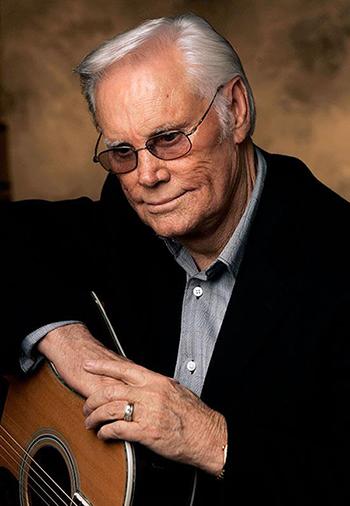Rest In Peace, Possum
By • May 2, 2013 0 1600

One fan, upon hearing that the legendary George Jones had died at the age of 82, said it was “the night that country music died.”
Many fans said the same thing: “RIP, Possum.”
Given the present day pull of pop on the country music world that exists today, it might be more accurate to say that honky tonk music of the kind that Jones with his twangy, rich voice, his every-which way sideburns and pompadour when it didn’t turn into a marine crewcut, his booze-and-bar filled life and his full-of-a-whole-lot-of-trouble marriage to country music’s tragic and gifted and unforgettable queen Tammy Wynette, personified had died with him.
He had his ancestors, not the least of which was Hank Williams, the skinny guy with the big guitar and cowboy hat and sports jacket who practically invented honky tonk and the fast-driving, hard-drinking life style, coming out of hard-scrabble. These guys came out of working class places and towns in Oklahoma, Texas and the smack-dab-in-the-dust middle of California that included Waylon Jennings and the lone surviving member Merle Haggard—not counting Willie Nelson who’s like an armadillo that always gets across the road, come taxes or whatever.
Jones came out of dusty parts of Texas wanting to sing because, according to the stories told, at least in part because his daddy would come home drunk and wake up his kids to sing to him. From there, it was only a step towards hustling and singing in the streets for quarters and doing a good job of it. Jones sang with a hitch and a twang, and the voice was clear as a slap in the face at closing time.
You could hear that aching heart experience in Conway Twitty, in Williams, Ronnie Milsap, Wynette and Loretta Lynn, and Dolly Parton, and Jennings on the road out in the big empty of Texas, in that gorgeous voice of Vince Gill’s, in the more gentlemanly voices of Marty Robbins and Ray Price, the latter a guy who had a voice that sounded both wounded and authoritative.
If you grew up in the Midwest in the 1950s, or hung out in Missouri or Kansas or West Virginia or the bottom part of Ohio near Kentucky, those voices made their way underneath the gyrating belly of rocking rollers.. The rockers—with the exception of Elvis who had a little gospel and country road hitch and high voice sometimes—hadn’t gotten around to serious heartbreak yet in those days. The likes of Jones, Haggard, Price, and not to forget Johnny Cash and Twitty wore black or fringed, glammed up jackets and every now and then socked it to the sock hoppers with a song like “Young Love” by Sonny James.
Jones was an adult—there wasn’t much question of that, his pains and wounds, received and handed out, were of the adult variety that caused friendships to end, and marriages and families to break up. Two successive wives endured his boozing, his volatility—both his second wife and the famously third one Tammy Wynette took his car keys away only to find out that he was barreling down the highway on a lawn mower toward the nearest honky tonk bar—to soak the cold beers, the sawdust on the hardwood floor, and have enough change to pump up the jukebox and play a Hank Williams song. Naturally, he made music out of driving a John Deere to a honky tonk.
No one questioned Jones on his authenticity or talent. When he sang a song it was like he stood there naked as a jaybird, exposing himself with such candor that you couldn’t turn away. Only Jones could pull off his most famous song “He Stopped Loving Her Today”, about a man who vowed to love his woman til the day he died. This is a song so full of schmaltz, you could cry it a river, except that Jones just barrels it through—voice-to-heart-to-you-and makes you catch your breath.
He had something—you didn’t have to listen between the lines or read between them either—best way to get Jones is listen to the music on U Tube, with and without Tammy and catch the titles, a life strung together: “White Lightning”, “We’re Gonna Hold On” (with Tammy, along with “Golden Ring”,)_“I was Country When Country Wasn’t Cool”, “Still Doin’ Time”, “I Always Get Lucky With You”, “She Still Thinks I Care”,”I’m a Long Gone Daddy…I’m a Leavin Now”, “I Just Don’t Give a Damn”, “If Not For You”, “How Wonderful a Poor Life is”, “The Cold Hard Truth”, “Brothers of a Bottle”.
There are parts of the Wynette-Jones marriage, love fest, brawl and trouble in there—but Wynette is also at least partly famous for the spit-in-the-wind marriage anthem “Stand By Your Man”, (a song that is text book heartbreak), although there were cynics who kept hearing “Can’t Stand My Man” in the song but she would later sing about “D-I-V-O-R-C-E”. Their duets were classics—he with his hair then abundant, she with a cascade of blonde going down her back. Only the Twitty-Lynn duets—which don‘t have the added raw paint of personal experience—come close to that sort of genius.
Wynette died in 1998. Jones went on singing and eventually stopped drinking and carrying on, and became a living legend—as in greatest living country singer, collected honors—a Kennedy Center Honor among them—and kept on singing, at times bemoaning country’s embrace of pop. Nobody would call him a pop singer—but he was a pure, and great singer of heartache and honky tonk—the kind that even Frank Sinatra—who admired him—understood.
As for Possum—his other nickname was “No Show Jones” for missing concert dates—well, friends thought his sharp features resembled that of a possum.
So, RIP, Possum. You stopped loving her today, but who knows what comes after that.

